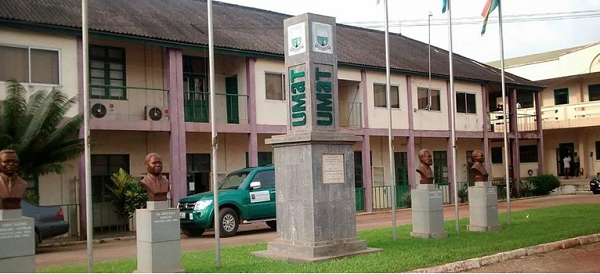
UMaT opens new campus at Essikado
The University of Mines and Technology (UMaT) in the Western Region has opened a new campus in the Twin City of Sekondi-Takoradi to bring higher education to the doorstep of students and workers seeking to pursue further studies.
The university’s new campus, which is located at Essikado, is a collaborative effort with the Ministry of Railways Development to convert the School of Railways and Infrastructure Development into the new campus.
Quality education
Speaking at its 16th Matriculation at Tarkwa, the Vice-Chancellor, Prof. Richard Kwasi Amankwah, expressed the determination of UMaT to extend quality education to all as it was poised to introduce more programmes that would address the social and industrial needs of the country.
He said since UMaT was a recognised institution of higher learning with specialisation in mining, petroleum, allied engineering and management science education, “we seek to challenge our learners to discover their potential and achieve the highest level of intellectual capabilities and personal growth.”
Specialisation
Such moves, he said, would satisfy demands of the industrial and professional needs of the country that had the potential to propel growth.
Prof. Amankwah said the university was establishing the School of Sustainable Development, in addition to the Environmental and Occupational Health and Safety Engineering.
According to him, the university would also run programmes in Forestry and Landscape Engineering as well as Waste and Resource Engineering.
Practice of engineering
He said the university would also introduce a course in the practice of engineering, where students would engage artisans in various communities and through apprenticeship, improve on their creativity, embrace challenges and prepare for the world of work.
He said that would be in addition to the hard-core engineering courses, adding that, “we are also introducing courses on Critical Thinking and Integrated Thought, Financial Education and Leadership, to further improve the quality of our products.”
By the next academic year, he said the UMaT would begin professional doctorate programmes to encourage practising engineers and professionals to earn higher degrees through the innovations they brought to their day-to-day practice.
Female enrolment
He said as the university extended its frontiers, one critical area it would continue to push was the gender mainstreaming policy aimed at ensuring 50 per cent female enrolment.
This year, he said, out of 4,351 undergraduate applications received, only 1,062 representing 24 per cent were admitted and “out of these, 71 per cent of the students were males and only 29 per cent were females. At the postgraduate level, 167 students were admitted.”
He said much as the university was focused on its progress, like other universities, the past year had been a challenging one considering the continuing effect of the COVID-19 pandemic.
Restrictive protocols
Prof. Amankwah said even though the pandemic had affected all spheres of human activities with restrictive protocols, “we are happy we could reopen for academic work after many months of anticipation — globally, academic activities have been critically affected as a result of the pandemic.
“The United Nations said the pandemic has created the largest disruption of education system in history, affecting nearly 1.6-million learners in more than 190 countries and all continents,” he said.
He said as unfortunate as it was, there were lessons leant that would continue to shape the future of education, saying, “the combination of virtual and face-to-face interactions as practised on campus is aimed at reducing contact and the reduction of spread of the disease.”
